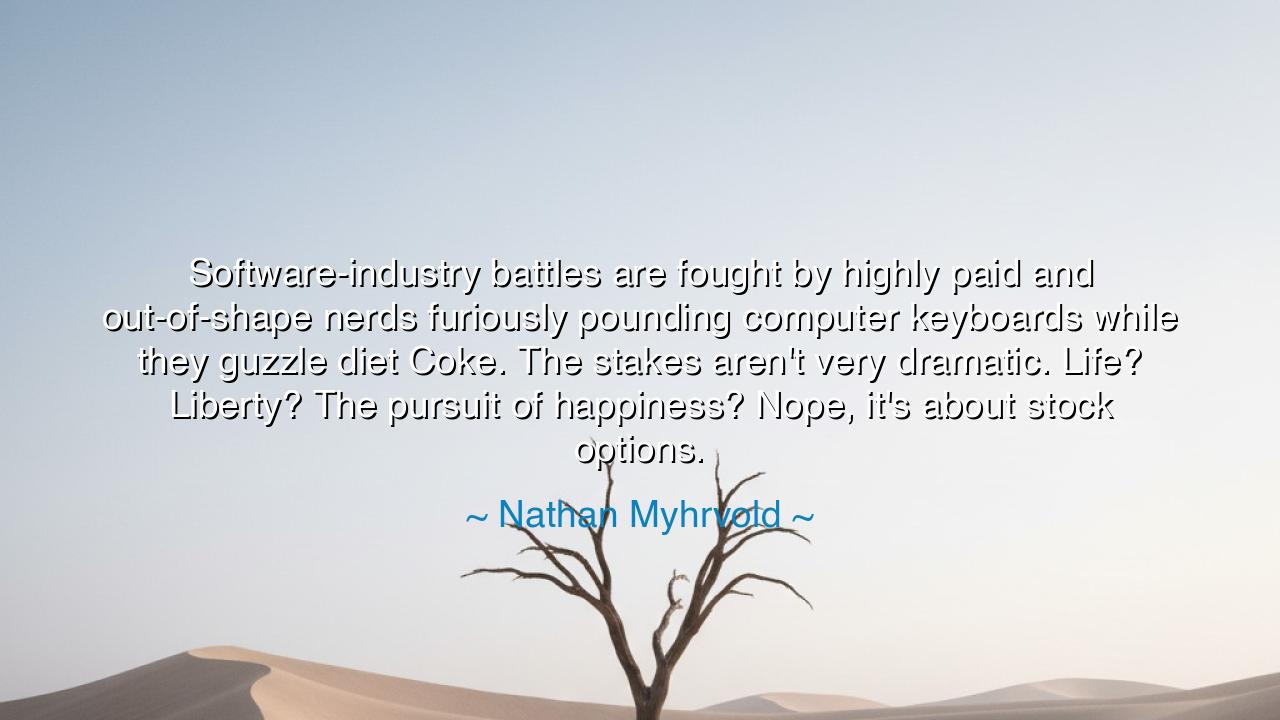
Software-industry battles are fought by highly paid and
Software-industry battles are fought by highly paid and out-of-shape nerds furiously pounding computer keyboards while they guzzle diet Coke. The stakes aren't very dramatic. Life? Liberty? The pursuit of happiness? Nope, it's about stock options.






When Nathan Myhrvold quipped, “Software-industry battles are fought by highly paid and out-of-shape nerds furiously pounding computer keyboards while they guzzle diet Coke. The stakes aren’t very dramatic. Life? Liberty? The pursuit of happiness? Nope, it’s about stock options,” he was not merely mocking the modern world of technology—he was lamenting it. Beneath his wit lies an ancient warning: that when the fire of human ambition burns without purpose, it consumes not empires, but meaning itself. His words are a mirror, reflecting how the wars of intellect in the digital age, though fierce and tireless, have been stripped of the noble causes that once stirred the hearts of men.
In ages past, battles were fought for the soul of civilization. Men took up swords for honor, for faith, for freedom. They sought to carve ideals into the stone of history. Yet in Myhrvold’s words, the arena has changed. The warriors now wear headsets, not helmets; they wield keyboards, not blades. They fight not for glory or justice, but for market share and corporate gain. The cry of the modern battlefield is not “Victory or death!” but “Ship it before the competition!” Thus, his satire unveils the spiritual poverty of progress—a time when intellect is mighty, but purpose is small.
Consider the contrast between these two worlds: one ruled by the sword, the other by the screen. The Roman general Scipio Africanus fought to defend the Republic against Carthage, his victories shaping centuries of peace. The modern engineer fights to increase quarterly profits, his triumph measured in clicks, downloads, and stock options. Myhrvold does not scorn intelligence—indeed, he himself is a titan of intellect—but he mourns its disconnection from meaning. He reminds us that when innovation loses its soul, it becomes a shadow of true creation.
Yet, his words also carry humor, the laughter of one who knows that satire can heal what anger cannot. When he describes the “out-of-shape nerds guzzling diet Coke,” he conjures an image both comical and tragic—a generation of modern warriors enslaved by the very machines they command. They labor endlessly in a war that yields no peace, driven not by destiny but by greed disguised as progress. It is a portrait of brilliance wasted in triviality, of creativity yoked to commerce.
But even in his mockery lies hope. Myhrvold’s insight invites reflection, not despair. The true lesson of his words is not to condemn the software engineer, but to awaken the philosopher within him. For what is technology, if not the modern form of fire—capable of illuminating or consuming, depending on the heart of the one who wields it? The ancients who discovered the forge did not curse its power; they guided it with wisdom. So too must the builders of our age remember that purpose gives power its direction, just as virtue gives strength its nobility.
History offers us this eternal pattern. When Leonardo da Vinci designed his machines, he dreamed not of wealth, but of wonder. His art and science were one, for both sought to uncover truth. When Alan Turing built his early computers, he did so to save lives, not to increase profit margins. These were the true warriors of intellect—those who used knowledge in the service of humanity. Myhrvold’s lament is that too few today fight such battles. The war for stock options has replaced the war for the soul of man.
So, let this be the teaching drawn from his sharp humor: labor is not sacred unless its purpose is worthy. Let the coder remember why he builds, the inventor why he creates, the thinker why he dreams. Wealth may follow purpose, but purpose must come first. For a life spent in pursuit of profit alone is like a machine that runs endlessly without producing light.
And thus, the ancient wisdom speaks again through the modern tongue: create not for gain, but for greatness. Work not for stock, but for legacy. For when the hands that type remember the heart that guides them, even the hum of a computer becomes the song of creation—and the “nerds at their keyboards” may yet become the philosophers of a new age.






AAdministratorAdministrator
Welcome, honored guests. Please leave a comment, we will respond soon